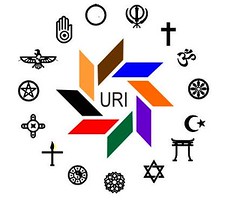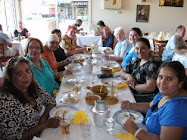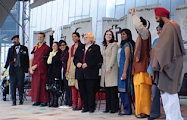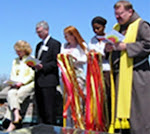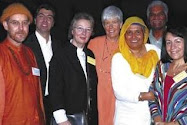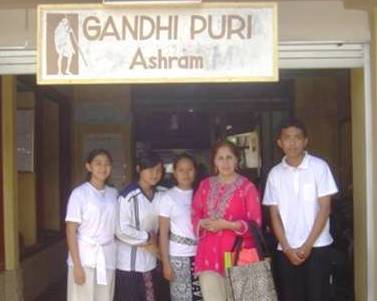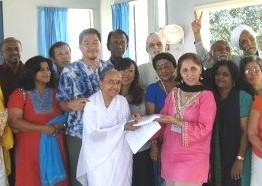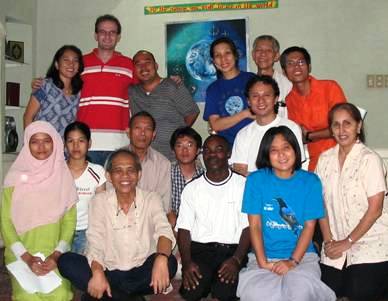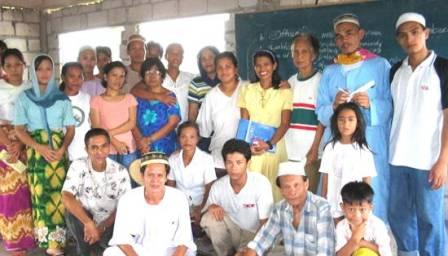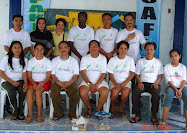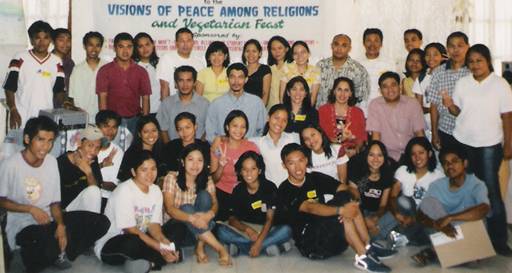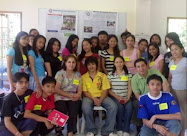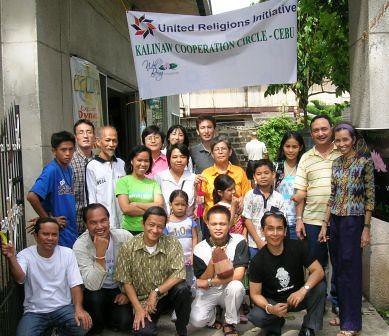May 3, 2009
The birth of an idea arising from a need
In April 2009 United Religions Initiative (URI) in Southeast Asia-Pacific (SEAPac) took its first steps towards actively engaging in the endeavor of realizing its vision of peace, justice and healing in the region and began to help build bridges of friendship and solidarity with a group of grassroots Muslim, Christian and indigenous leaders of conflict-affected communities in Lanao del Norte in Mindanao, the southern region of the Philippines.
This unprecedented regional initiative by URI was made possible through the help of Mohammad Musa Sanguila, one of the distinguished members of the Board of Trustees of Pakigdait who is also currently chairperson of the URI SEAPac Regional Council and member of the URI Global Council. In a meeting in Manila of URI SEAPac trustees last October 2008—which was attended by former regional chairpersons Dr. Amir Farid Isahak (Malaysia) and myself (Marites Guingona Africa, Philippines), and Shakuntala Vaswani (URI SEAPac Regional Coordinator), Jessiee Kaur Singh (Commons CC, Australia), and Orlan de Guzman (URI Regional Information and Communications Officer)--the idea was brought forth by Musa. It surfaced during the deliberations on how to put to good use the remaining regional funds of 2008. The trustees warmed up to the idea of using the funds in aid of the victims of the conflict and war in Mindanao.
The idea was supported by Cooperation Circles in the region and a project proposal was submitted to the URI hub in San Francisco, U.S.A. by the Iligan-based PAKIGDAIT, a local interfaith NGO headed by Musa Sanguila, Fr. Reggie Quijano and other distinguished leaders of the local interfaith community in Iligan. Pakigdait is an active Cooperation Circle (CC) of URI in Mindanao and it has been serving the cause of peace, justice and the wellbeing of the people of Lanao del Norte for over a decade.
The project proposal was approved by the global URI hub after the Global Assembly in Mayapur, India last December. It was finally launched in Tubod, Lanao del Norte during the celebration of the Lanao Month of Peace last March before the presence of Governor Khalid Dimaporo. Rev. Charles P. Gibbs, Executive Director of URI, awarded the symbolic check to Pakigdait. He was there to participate in the URI SEAPac Regional Assembly in Tubod from March 15-20, 2009.
Reaching out and touching base with the people in pain
A month later, in April, the gracious and able leaders and members of the PAKIGDAIT CC opened its doors to assist URI in conducting the first of two introduction workshop-seminars on “ENGAGING THE MORAL IMAGINATION IN GRASSROOTS INTERFAITH DIALOGUE AND COMMUNITY-BUILDING” Having attended the two-year action-reflection pilot peacebuilding workshop that was conducted by Dr. John Paul Lederach (a renowned Mennonite trainer and lecturer on peacebuilding and conflict-transformation) and Dr. Herm Weaver for URI (from 2006-08), I volunteered to design and conduct the workshop with the help of Sarah Queblatin, URI Regional Projects Coordinator.Sarah and I left Manila for Cagayan de Oro in Mindanao a day earlier (April 20, Monday) hoping that we would have the chance to meet with the Pakigdait team prior to the workshop. It was a 45-minute flight from Manila to Cagayan de Oro and we were met by amiable driver Lito who took us from the airport straight to the Midway Beach Resort in Initao, Misamis Oriental (halfway between Cagayan de Oro and lligan City).
On our way to Initao, I received a call from Abel Moya, the Projects Director of Pakigdait, informing me that a bomb exploded the Agus Bridge near the Maria Christina Falls in Iligan early that morning and that, although the workshop would push through as scheduled, the number of participants would probably be reduced! The Agus Bridge was a main thoroughfare that allowed commuters travelling along the coast of northern Mindanao to pass through.
Sarah and I spent the day alone in Midway beach, waiting for word from Abel and the Pakigdait team and hoping for the best. The beach always had a seductive effect on me, but that time the concerns of work made me oblivious to its lure. We simply sat under a nipa hut and passed the time discussing the workshop and sharing with each other our personal spiritual journey and our aspirations for peace.
The Pakigdait team and their participants arrived late morning the next day (April 21, Tuesday). There were around twenty-four Muslim, Christian, and indigenous grassroots leaders from the four conflict-affected communities of Linamon, Kauswagan, Kolambugan and the City of Iligan in Lanao del Norte that arrived for the workshop. We began the workshop after lunch with interfaith prayers and introductions from Musa Sanguila, and an opening exercise led by Xarifa Sanguila, Musa’s lovely wife (who is also a member of Pakigdait).
After the opening exercises and the expectation check, the first module was Visions of Peace Among Religions (VPAR). A slideshow of images of violence and war were presented onscreen. Then the participants were divided into small groups of five and were encouraged to share with one another personal experiences of violence in their lives. The exercise gave some of the traumatized victims, like Rosie Sobrado, a fifty-year old Catholic church worker from the little town of Inudaran in Kolambugan, Lanao del Norte, the chance to share the horrors that her family experienced when their home was attacked and members of her family shot at and killed by around 50 rebels of the Moro Islamic Liberation Front (MILF) last August. She spoke of her husband being hit, and of her one-year old grandchild’s belly being slashed open. Her pain was palpable but her courage was awe-inspiring. She held her tears at bay as she told her story before the group that was composed also of Muslims. She said that not all Muslims were bad and that she was willing to work with them to help their community find peace. The Muslim leaders nodded their head in silent agreement.
The exercise of recalling their experiences was painful and difficult, but it was followed by a visioning exercise that helped them momentarily find a way out of their pain. Participants were invited to work together as a group and draw a picture of the community that they wished to see in five years’ time. John Paul Lederach’s Moral Imagination was introduced in helping to make them aware that they were capable of imagining something different, of creating something new and desirable even while they were rooted in the painful realities of their present lives.
The workshop moved on to the module on Conflict Transformation to help them build capacities for realizing their vision of a peaceful community. The participants were asked whether conflict was good or bad. Many said it was bad, but there were a few who acknowledged that it was neither good nor bad; that it was a turning point in their relationships that can be used to strengthen and deepen those relationships. They went on to understand conflict in terms of differences in position, interest, value and need. The first day ended at around six in the evening with sharing of reflections on a personal experience that they had with someone whom they had been in conflict with, and what they imagined the interest, value, and needs of that person might be. This was capped with a slideshow presentation on the studies done by Dr. Masaru Emoto on the effect of thought forms on water crystals. It seemed to be a powerful reminder that the human body (and the planet Earth!), being composed of 70 percent water, is vulnerable to our thought forms and is affected by them in a significant way.
Walking together in oneness along the labyrinth of life
The second day (April 22, Wednesday) began with an interfaith prayer on the beach and a walk in the labyrinth that Sarah drew on the sand. The participants were asked to bring an object that symbolized their “being” as they followed the labyrinth’s path while imagining their life’s journey. They were asked to remember their life’s turning points along the way and how they grew in awareness of the workings of God/Allah. As they reached the center of the labyrinth, they each took a few moments of silence to honor God/Allah in their lives. Ustadz Jawad, a Muslim leader, cried out the shahada, so moved was he by the experience!
The afternoon was spent learning how to see and appreciate differences in people’s position and disposition, and how to deal with them in ways that promoted mutual respect, understanding and cooperation. The meaning of true dialogue in the context of faith was defined, and later a personal exercise in “humanizing the enemy” and engaging heart listening in imagining the “enemy’s” needs and fears gave the dialogue exercise a practical application. The participants shared their experiences on this with the members of their small group, and then they were asked to choose a story that they wished to role play. It was a fun activity that brought laughter to the circle and engaged the participants holistically in the learning experience. At the end of the day, they returned to the labyrinth bearing their commitment to peace and their symbols of themselves which they solemnly offered at the labyrinth’s center.
Although that part of the journey ended, the sense of being in the midst of a new beginning lingered in me. This was the first time in over thirty years that I have returned to my southern homeland—Mindanao--and touched based with the pain of its people! I have been away too long and this labyrinth of peace is leading me back to its heart center! I resonated with Light-- the name an eloquent Higa-onon (an indigenous tribe in Mindanao) wanted to call himself--when he expressed his wish that the workshop could be extended to one more day. One more day of peace is an oasis in the desert of fear and uncertainty that this group of courageous people are experiencing in their daily lives. Hoping for one more day is a heartwarming sign of hope alive, and I was glad that I could still speak the language well enough to understand them and be part of their journey!Heart listening, hope mongering, and hankering to carry on for peace. Our colleagues at Pakigdait advised us to end the workshop by 3:30 in the afternoon so that it would still be light when the participants travelled back home to their communities. This was for safety, they said. Sarah and I rode with Musa and Abel to Iligan after the workshop ended that afternoon (April 22, Wednesday). We were brought to Charebel Suites where we were told that many visiting guests from different NGOs and international aid organizations often stayed. It was safe there, we were told.
The next day (April 23, Thursday), we had the privilege of attending and assisting Tina Lomoljo, Executive Director of BirthDev, and her amazing team of young facilitators and volunteers in the Emotional Recovery workshop for the victims of war in Lanao del Norte. This was another component of the URI program under the care of Pakigdait. Sarah and I decided to stay and participate in the experience.
There were two sessions that day. The morning session was held in Barangay Upper Hinaplanon in the municipality of Cabaro, and the afternoon session was in Barangay Tomas Cabili in Ceanuri, Iligan City. These were communities where Muslims, Christians and indigenous people from conflict areas have fled and lived with families and friends.
There were two groups of children (5-8 years old, and 9-12 years old), and a group of around fifteen adults that attended the morning session. I sat with the 9-12 year old group of children; there were about 15 of them, all Muslims. After the introductions and explanation on what emotional recovery meant, they were asked to draw a picture of the recent attack on their home community in order to release or express their emotions. I was deeply moved to see that many of the drawings showed guns firing and killing people, and airplanes dropping bombs or firing at homes and fleeing people. They spoke about the experience shyly and haltingly in a way that almost belied the horrors that they went through. It was heartrending to listen and not be able to do anything much to heal the psychic wounds inflicted on innocent children!
The adults were more articulate in expressing their suffering and fears. They said they could not return to their communities because they feared that fighting would break out again. They expressed hope that both the military and the rebels would settle their differences so that peace could be restored and they could return home at last.In Ceanuri, during the afternoon session, there were more groups of children; this time there was an older age group of 13-17 years of age. Sarah sat with them while I remained with the adults to listen to more stories of their plight.
The stories I heard stayed with me a long time. There was a young Muslim mother carrying an adorable five-month old baby. I was told that she was born at the height of the evacuation. Her husband used to farm in the fields but now, he said, he is forced to live a life of dependency in the city because he could neither read nor write.An elderly Maranao Muslim woman spoke of how she wanted to take off her malong (wrap-around skirt) so that she could run away fast from the military soldiers who were in hot pursuit of the rebels. She said that the embarrassment of running naked was overcome by her fear for her life.
A dignified Sultan spoke painfully of how they could not even bury their dead; they had to leave her body untouched because the military demanded inspection of the body for wounds that would indicate the presence of the enemy.
Before we left the community at the end of the day, we heard the elders ask: “Unsa man ang inyong matabang sa amo?” What can you do to help us? It was a painful question that I struggled to respond to. All I could promise was that URI would continue to be one with them in their journey and will share their stories with people who cared around the world. They heaved a sigh, and I wanted to say more but could not.
At the end of the day, Sarah and I returned to the Pakigdait office with Tina and the amazing group of young facilitators and volunteers of BirthDev to share our experiences of the day. I was deeply moved to hear that despite the tiredness of body, the passion, dedication and commitment to carry on for peace, justice and healing remained strong among them. It was a humbling experience for one who has been away from this southern homeland for over three decades; I must return and continue to speak anew the language that I thought I had left by the wayside and forgotten.
